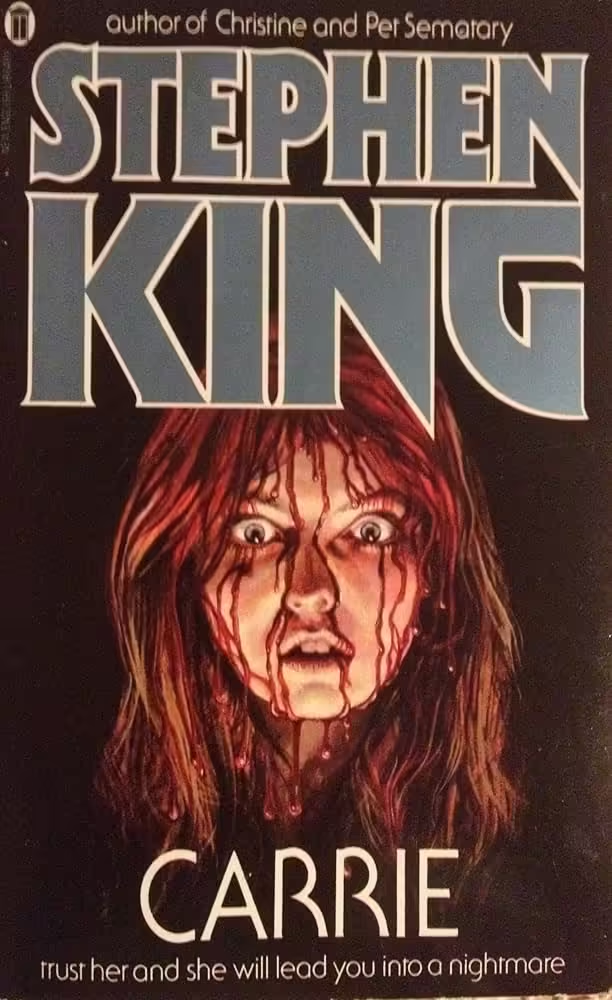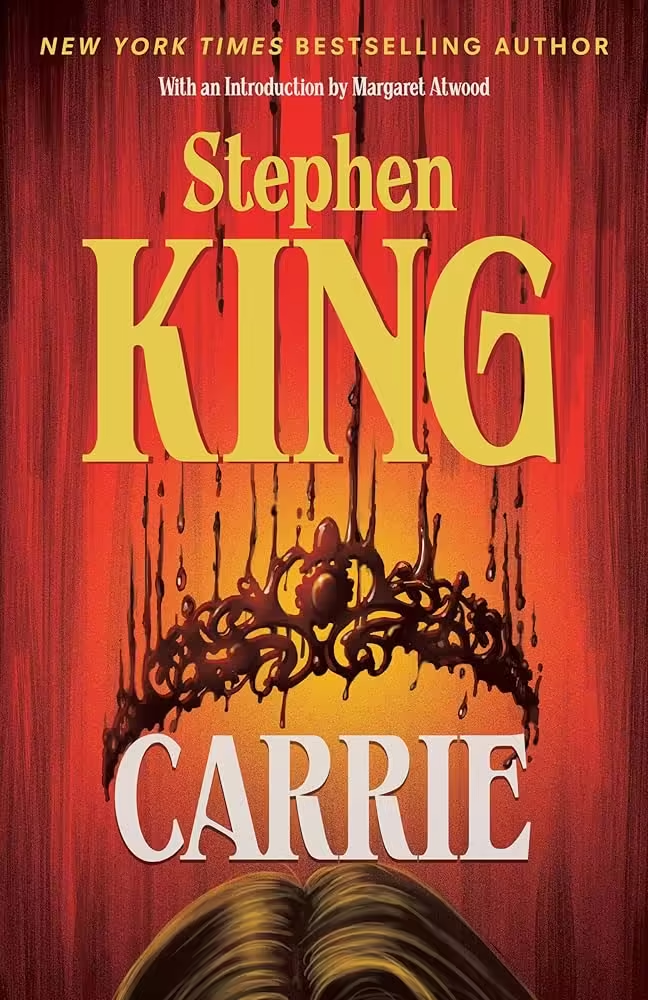For fans of Stephen King—or anyone curious about his legendary horrors—Carrie is the perfect starting point. This is King’s first published novel, a tale that nearly ended up in the trash if not for his wife, Tabitha, who insisted the world needed to hear this story. And thank goodness for that, because Carrie quickly became an iconic tale of horror, vengeance, and telekinesis. It’s dark, it’s tragic, and it’s the stuff of nightmares—especially for anyone who still shudders at high school memories.
I’m working my way through Stephen King’s massive bibliography, and I couldn’t skip over Carrie. Here’s my spoiler-free review of Carrie by Stephen King, the story that started it all.
A Simple Premise with a Sinister Twist
The story of Carrie is simple in premise but rich in execution. It follows Carrie White, an awkward, ostracized high school girl in a small town who endures unthinkable cruelty from her peers—and even worse from her own mother, a religious zealot who believes nearly everything Carrie does is sinful. But what no one knows is that Carrie has a secret: she’s telekinetic, meaning she can move objects with her mind. As her powers grow, so does her anger, leading to one unforgettable and haunting night—prom night.
King’s Talent for Capturing Teenage Angst

One of the strongest aspects of Carrie is how vividly King captures the brutal reality of teenage life. From the infamous scene in the girls’ locker room, where Carrie’s nightmare truly begins, King spares no detail in showing just how vicious high school can be. Through characters like Sue Snell, who feels guilt over her treatment of Carrie, and Chris Hargensen, the queen of cruelty, King paints a vivid picture of the different ways teenagers react to peer pressure, insecurity, and guilt.
King’s depiction of bullying feels almost painfully real, bringing back those awkward, anxiety-filled memories of high school. The social dynamics, the tension, and the desperation to fit in or avoid ridicule are all present, reminding readers just how universal Carrie’s struggle is. The supernatural twist only amplifies this, making Carrie’s telekinetic powers a terrifying metaphor for pent-up anger and a desire for revenge.
Telekinesis and the Unleashing of Pain
While Carrie may be known for its telekinetic twist, the powers aren’t just a flashy addition. King uses Carrie’s abilities to dig deeper into the consequences of abuse, isolation, and repression.
Her telekinetic powers grow alongside her despair, becoming a devastating force. Carrie doesn’t just become dangerous; she becomes a symbol of all those left on the fringes, underestimated and pushed too far. The events leading up to prom night become a ticking time bomb, and when that bomb goes off, it’s both shocking and oddly cathartic.
One unique feature in Carrie is King’s use of a documentary style, with portions of the story presented through “interviews” and “reports.” It adds an unsettling realism to the tale, making it feel like a true crime story you’re piecing together, layer by layer. It’s not just a supernatural horror tale; it’s a tragedy, told with a chilling sense of reality that lingers long after you turn the last page.
The Big Question: Is Carrie Scary?
Here’s the horror reader’s big question: Is it scary? In a word—yes, but maybe not in the way you’d expect. Carrie isn’t about terrifying monsters or lurking shadows. The real horror here is the relentless cruelty and heartbreak Carrie endures.
The story is as much a tragedy as it is a horror tale.
Carrie White is not the villain; she’s a victim of relentless bullying and a loveless home. Her telekinesis is a symbol of her desperation, her only way to fight back against a world that won’t stop hurting her.
If there’s a true monster in Carrie, it’s her mother, Margaret White. A religious fanatic with her own twisted sense of morality, Margaret is cold, fanatical, and terrifying in her own right. Her control over Carrie is oppressive, and it’s clear she’s shaped Carrie into the frightened, traumatized girl we meet. King’s portrayal of Margaret is one of the most chilling aspects of the story, adding an extra layer of horror that feels disturbingly real.
Final Thoughts: A Tragic, Timeless Tale of Revenge
In just under 300 pages, Carrie packs an emotional punch. King’s ability to make readers empathize with Carrie, to feel her pain, and then watch as she finally pushes back, makes this novel unforgettable. By the end, I felt a deep sadness for Carrie—a character so misunderstood, mistreated, and doomed. Carrie doesn’t offer a happy ending, but it does offer a memorable, haunting journey into the darkest corners of human behavior.
For anyone exploring King’s work, or for horror fans seeking something that’s as much tragedy as it is terror, Carrie is a must-read. It’s a story of revenge, but also a poignant exploration of what happens when a person’s pain is ignored until it boils over. My rating? A strong 9/10. Carrie White’s story is unforgettable and deeply haunting, claiming its place as a classic of horror literature.
Looking for more King? Check out our review of Salem’s Lot HERE.


